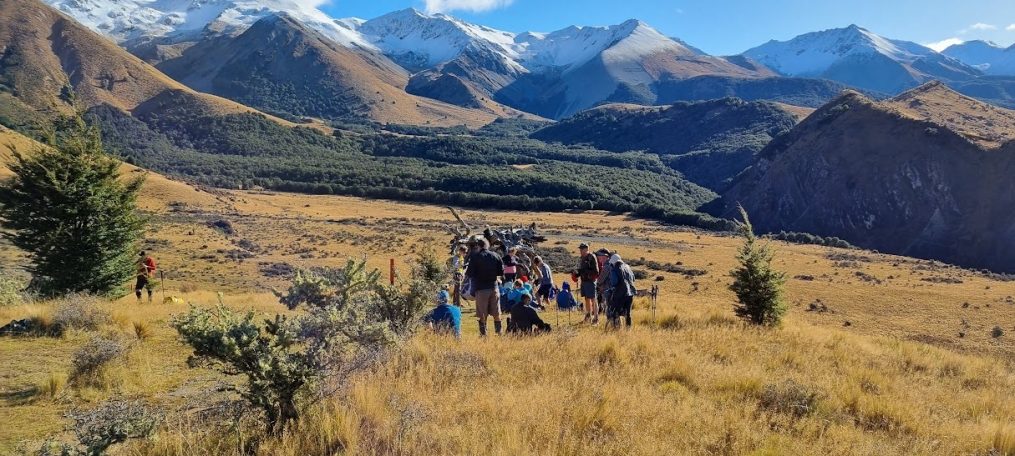| Leader | Mentor | Understudy | Tail Ender | |
| Standards | Alan H | Alan N | Jan Barber | Ali M |
| Alternates | Liz S | Gavin | Ray | Kiwan |
Distance: 9.5km (Stds), 4km (Alt)
Duration: 5hr 35min (stds), 4hr 50min (alt)
Elevation: Max Alt 1253m (Std), 1039m (Alt)
Min Alt: 603m Ascent: 650m (Std), 424m (Alt)
A group of 32 trampers set off with one of our regular drivers, Victor, on a clear sunny morning towards our challenge for the day, to climb Peak Hill. Chris, as past, past, past President (or maybe more pasts) welcomed everyone including our four visitors: Sophie, Basil, Charlie and Veronica. After encouraging members to sign up to the vacant roles for this and the next few tramps and writing of the diary Chris was pleased to see more of these roles filled by the time the forms had been circulated a couple of times.
Two hours after leaving Bishopdale we arrived at the Peak Hill carpark. We got our packs on and split into two groups of 16 people ready to follow the poled route across private farmland and over the stiles onto the hill, climbing through matagouri and celmisia scrub to the ridge.
The standards climbed steadily up to the top of the first ridge where everyone was pleased to stop by the information board for morning tea. Being St Patrick ’s Day, Marie-Therese celebrated by wearing a green wig until the climb caused her to start to overheat. Refreshed after our break we continued on, realising as we thought we were heading to the peak, that no, there was another and another! Our driver Victor passed us easily as we stayed together as a group and was at the top enjoying his lunch long before we arrived.
As we stopped along the way a discussion took place on what is the difference between a Mountain a Hill, a Summit or a Peak. On checking “Google” it would seem the difference is vague and can be used interchangeably but there is still some difference in the literal meaning of these.
A mountain is generally a huge form of land which has uplifted above the surrounding land and its elevation is steep. Whereas a hill is a land form that extends above the surrounding terrain and is generally less tall and steeper than a mountain.
A Summit is a point on a mountain surface that is higher in elevation than all points immediately adjacent to it. Whereas a Peak is the pointed top of a mountain. The distinction between the Summit and the peak is unclear and largely subjective. Most of the time they’re used interchangeably. Peak requires the pointy shape though, which is part of it. Summit is the very top and is not defined by a pointed shape. It just means the very top. A mountain may have multiple peaks but there is always one Summit.
While Victor headed back down the way we had all come up, the standards continued along the ridge admiring the stunning views to the confluence of the Rakaia, the Mathias and Wilberforce Rivers on one side and Lake Coleridge on the other. Looking for the old fence on our right we eventually found our way to the corner of the Conservation land, headed left and followed the fence back along the end and the river side of the hill. About half way along there is a new poled route through the matagouri, bracken and Spaniards. This route has been partially cleared but is still somewhat challenging under foot. We finally got to the top stile and headed back down over the farm land and the waiting Alternates and the bus.
Everyone was pleased to have enjoyed great weather and to have made the climb to see some of the best views of any tramp we do. We knew we were not going to make it home to see the America’s Cup race on TV and agreed not to talk about what we saw/heard on our phones to allow the result to be a surprise to those who wanted to watch with bated breath. It turned out to be a day of celebration as NZ retained the America’s Cup! Text courtesy Jan Bbr
As an aside, I remember a School Journal story about how the Lake Coleridge Power Station (and therefore the power supply) was cut off by a great snow storm in 1918 and the mission to get the power back on. I found a reference to it at: https://thespinoff.co.nz/partner/objectspace/14-11-2018/the-single-object-a-quest-for-a-set-of-heroic-skis/ . There was some debate about Boris using Captain Scott’s skis to save the day! (Chris)





































